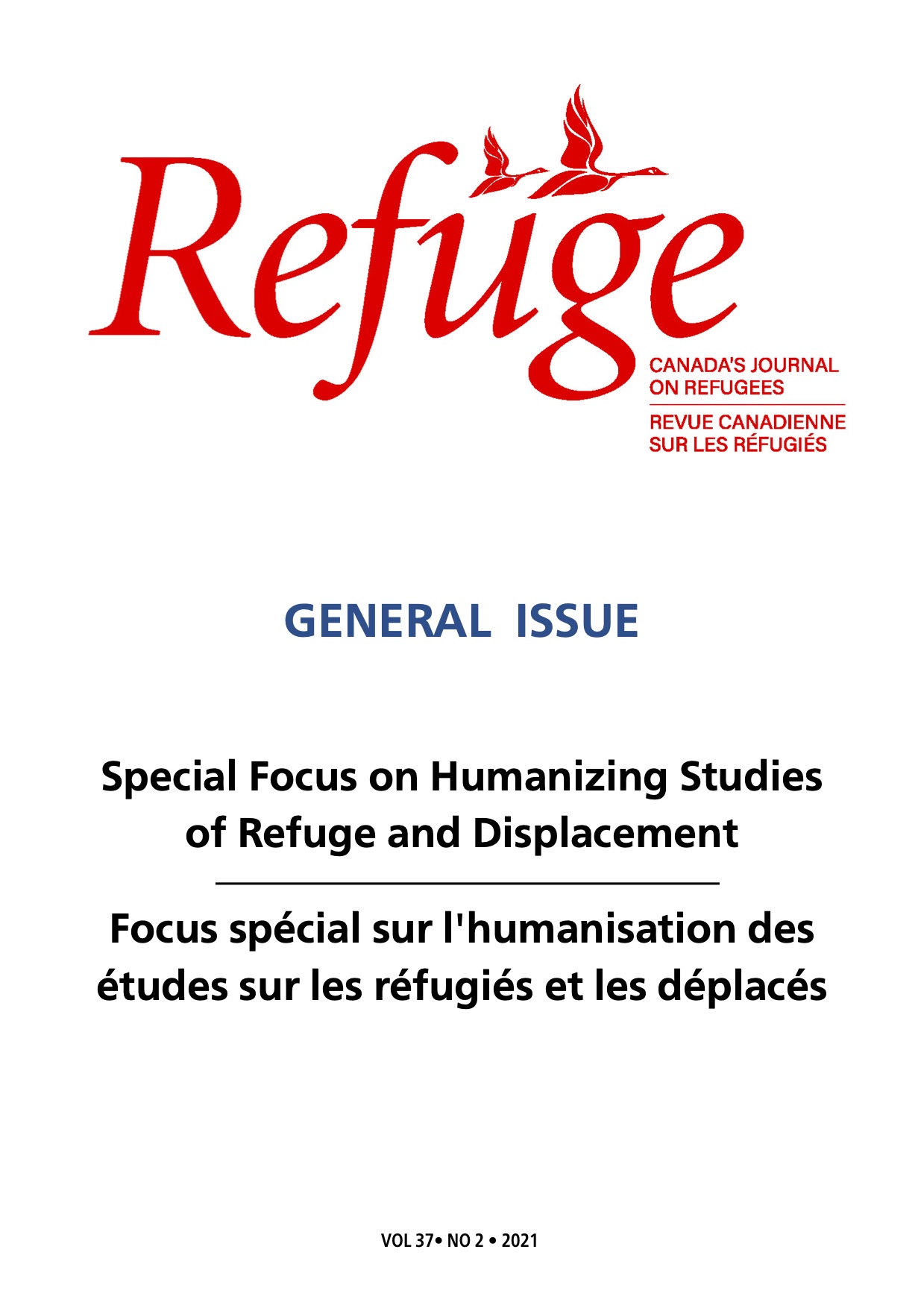The Cautious Politics of “Humanizing” Refugee Research
DOI:
https://doi.org/10.25071/1920-7336.40798Keywords:
humanization, refugee studies, refugee mobility, raceAbstract
In this intervention, I reflect on what it may mean to ‘humanize’ refugee research. The assumption often made is that ‘humanizing’ can arise through a concern with the particularity of the individual, through drawing from ‘the mass’ the narrative of the singular and employing this as a means to identify, , and potentially understand others. Yet such a move risks a reliance on creating relations of empathy and compassion that elide political responses to dehumanization and often relies on a assumption of what constitutes the category of “the human,” an assumption that has been critically challenged by post-colonial writing.
Metrics
References
Arendt, H. (1958). The origins of totalitarianism. Meridian.
Bleiker, R., Campbell, D., Hutchison, E., & Nicholson, X. (2013). The visual dehumanisation of refugees. Australian Journal of Political Science, 48(4), 398–416. https://doi.org/10.1080/10361146.2013.840769
Burrell, K., & Hörschelmann, K. (2019). Perilous journeys: Visualising the racialised “refugee crisis.” Antipode, 51(1), 45–65. https://doi.org/10.1111/anti.12429
Collyer, M., & King, R. (2016). Narrating Europe’s migration and refugee “crisis.” Human Geography, 9(2), 1–12. https://doi.org/10.1177/194277861600900201
Crawley, H. (2016). Managing the unmanageable? Understanding Europe’s response to the migration “crisis.” Human Geography, 9(2), 13–23. https://doi.org/10.1177/194277861600900202
Crawley, H., & Skleparis, D. (2018). Refugees, migrants, neither, both: Categorical fetishism and the politics of bounding in Europe’s “migration crisis.” Journal of Ethnic and Migration Studies, 44(1), 48–64. https://doi.org/10.1080/1369183X.2017.1348224
Darling, J. (2014). From hospitality to presence. Peace Review, 26(2), 162–169. https://doi.org/10.1080/10402659.2014.906872
Darling, J. (2018). The fragility of welcome. Fennia, 196(2), 220–224. https://doi.org/10.11143/fennia.75756
Dempsey, K. E., & McDowell, S. (2019). Disaster depictions and geopolitical representations in Europe’s migration “crisis.” Geoforum, 98(1), 153–160. https://doi.org/10.1177/194277861600900202
El-Enany, N. (2016). Aylan Kurdi: The human refugee. Law Critique, 27(1), 13–15. https://doi.org/10.1007/s10978-015-9175-7
Esposito, R. (2012). Third person. Polity Press.
Forgiarini, M., Gallucci, M., & Malavita, A. (2011). Racism and the empathy for pain on our skin. Frontiers in Psychology, 2, Article 108. https://doi.org/10.3389/fpsyg.2011.00108
George, R. (2018, May 23). Exile or refuge? Lights in the Distance overturns the spurious distinction. New Statesman. https://www.newstatesman.com/2018/05/daniel-trilling-lights-dark-exile-refuge-borders-europe-review
Gill, N. (2016). Nothing personal? Geographies of governing and activism in the British asylum system. Wiley-Blackwell.
Gill, N. (2018). The suppression of welcome. Fennia, 196(1), 88–98. https://doi.org/10.11143/fennia.70040
Greussing, E., & Boomgaarden, H. G. (2017). Shifting the refugee narrative? An automated frame analysis of Europe’s 2015 refugee crisis. Journal of Ethnic and Migration Studies, 43(11), 1749–1774. https://doi.org/10.1080/1369183X.2017.1282813
Hartley, L., & Fleay, C. (2017). “We are like animals”: Negotiating dehumanising experiences of asylum-seeker policies in the Australian community Refugee Survey Quarterly, 36(4), 45–63. https://doi.org/10.1093/rsq/hdx010
Haslam, N. (2006). Dehumanization: An integrative review. Personality and Social Psychology Review, 10(3), 252–264. https://doi.org/10.1207/s15327957pspr1003_4
Haslam, N., & Loughnan, S. (2014). Dehumanization and infrahumanization. Annual Review of Psychology, 65, 399–423. https://doi.org/10.1146/annurev-psych-010213-115045
Ibrahim, Y., & Howarth, A. (2015). Sounds of the jungle: Rehumanizing the migrant. JOMEC Journal, 7, 1–19. https://doi.org/10.18573/j.2015.10008
Jazeel, T. (2019). Singularity: A manifesto for incomparable geographies. Singapore Journal of Tropical Geography, 40(1), 5–21. https://doi.org/10.1111/sjtg.12265
Jones, R. (2016). Violent borders: Refugees and the right to move. Verso.
Kingsley, P. (2017). The new odyssey: The story of Europe’s refugee crisis. Faber & Faber.
Kirkwood, S. (2017). The humanisation of refugees: A discourse analysis of UK parliamentary debates on the European refugee “crisis.” Journal of Community and Applied Social Psychology, 27(2), 115–125. https://doi.org/10.1002/casp.2298
McDonald-Gibson, C. (2016). Cast away: Stories of survival from Europe’s refugee crisis. Portobello Books.
Migrant Voice. (2014). Migration and the media. https://www.migrantvoice.org/design2020/img/upload/1._Migration-and-the-Media-2014_.pdf
Nyers, P. (2006). Rethinking refugees: Beyond states of emergency. Routledge.
Papastergiadis, N. (2009). Wog zombie: The de- and re-humanisation of migrants, from mad dogs to cyborgs. Cultural Studies Review, 15(2), 147–178. https://doi.org/10.5130/csr.v15i2.2043
Sales, R. (2002). The deserving and the undeserving? Refugees, asylum seekers and welfare in Britain. Critical Social Policy, 22(3), 456–478. https://doi.org/10.1177/026101830202200305
Smith, D. (2016) Refugee stories: Seven personal journeys behind the headlines. Instant Apostle.
Smith, K., & Waite, L. (2019) New and enduring narratives of vulnerability: Rethinking stories about the figure of the refugee. Journal of Ethnic and Migration Studies, 45(13), 2289–2307. https://doi.org/10.1080/1369183X.2018.1496816
Trilling, D. (2018). Lights in the distance: Exile and refuge at the borders of Europe. Picador.
Weheliye, A G. (2014). Habeas viscus: Racializing assemblages, biopolitics, and black feminist theories of the human. Duke University Press.
Wilson, H. F. (2014). The possibilities of tolerance: Intercultural dialogue in a multicultural Europe. Environment and Planning D: Society and Space, 32(5), 852–868. https://doi.org/10.1068/d13063p
Downloads
Published
Versions
- 2021-11-22 (2)
- 2021-11-22 (1)
How to Cite
Issue
Section
License
Copyright (c) 2021 Jonathan Darling

This work is licensed under a Creative Commons Attribution-NonCommercial 4.0 International License.
Refuge authors retain the copyright over their work, and license it to the general public under the Creative Commons Attribution-Non Commercial License International (CC BY-NC 4.0). This license allows for non-commercial use, reproduction and adaption of the material in any medium or format, with proper attribution. For general information on Creative Commons licences, visit the Creative Commons site. For the CC BY-NC 4.0 license, review the human readable summary.







